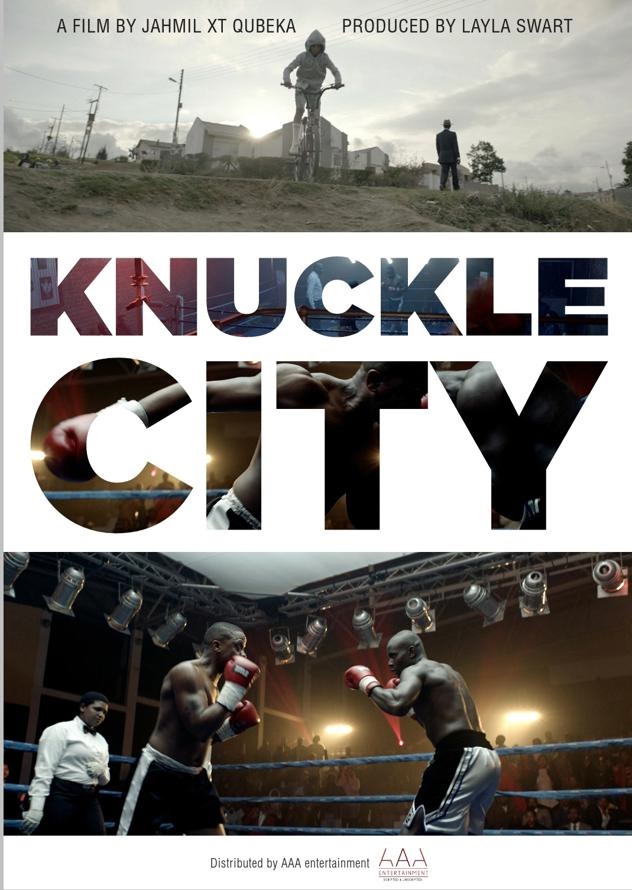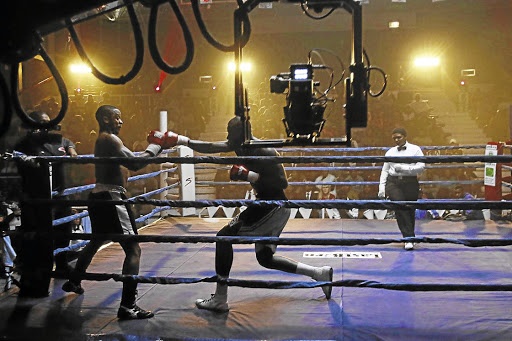
The opening night film at the 40th edition of the Durban International Film Festival was an intense, foul-mouthed, gangster thriller, Jahmil X.T. Qubeka’s Eastern Cape boxing tale Knuckle City.
Writer-director Qubeka is famous for having his 2013 opening night film Of Good Report effectively banned by state classifiers – a decision overturned on appeal.
Here four reviewers share their take on his latest film, three from the Talents Press programme, and one from City Press.
Knuckle City directed by Jahmil X.T. Qubeka
Produced by Layla Swart
Starring Bongile Mantsai, Nomhle Nkonyeni, Sivuyile Ngesi
CRITIC 1: A compromised tale of redemption
3 stars out of 5
Kayode Faniyi
In July 2018, a grisly death was reported in the South African media.
A former national boxing champion had taken the path to criminality – all allegedly of course – and had been pummelled to death by an irate mob.
Alongside two other men, it was reported, Maneli Mbilase, 40, had been accused of robbing two women at knifepoint.
Like Mbilase, Dudu ‘Night Rider’ Nyakama is a faded boxing star, wrung dry and spat out by a cruel system.
Played by Bongile Mantsai, a staple of South African television, Dudu is portrayed instead, for the most part, as the anti-Mbilase, a neighbourhood vigilante of sorts, and a former champion who still hankers after the spotlight with admirable dedication.
Never mind that at 37, he is an ageing man in a young man’s sport. Set in the boxing-mad township of Mdantsane, Knuckle City is the story of Dudu’s redemption.
Or not. The film’s simple portrait of redemption is only a pretext. Scrape away the pretext and Knuckle City is in fact the story of a family’s coherence — to maintain internal consistency — in the face of seemingly insurmountable odds.
Dudu’s brother Duke is an excitable jailbird whose inordinate ambition is a magnet for mortal danger. His hysterical mother lost the use of her legs in an ambush that killed his father, the infamous Art Nyakama.
Hounded by her grandmother, Dudu’s teenage daughter is nevertheless carousing with a neighbourhood gangbanger.
For all his eschewal of violence, Dudu himself finds it impossible to escape the burden his father’s influence or the moral quandary that poverty often involves.
Things threaten to fall apart, coming perilously close to doing so. Knuckle City, though, is a story of triumph.
Buffeted by a barrage of bad decisions and missteps, in an environment that amplifies them, the family survives intact but heavily bandaged.
Knuckle City is new territory for director Jahmil X.T. Qubeka.
The imperatives of box office success – M-Net looms ominously on the horizon – appear to have influenced Qubeka’s direction here.
With its ominous mood, its anti-heroes, the risqué dialogue, its bleak portrait of life in Mdantsane, and its pervasive pessimism, there is a noirishness to his latest film, a noirishness that eventually exits left, pursued by a Qubekan optimism (that scintilla of optimism a thorough pessimist can eke out).
The narrative technique is elliptical, predictably, and some of Qubeka’s predilection for the keenly observed detail remains (the gun in the crook of a bending gangster’s back, Mother’s Hen momentary whoop and stagger from the pleasures of cunnilingus), but gone is the glorious self-indulgence that obscured the narrative inadequacies of Sew the Winter to My Skin.
The joy of Qubeka is in his cinematic excess. Forced to succumb to formula, an existential ordinariness permeates Knuckle City.
Shorn of its exterior glitter and sense of occasion, its central conflict feels simultaneously undercooked and overwrought. Narrative traction is achieved at a cost that includes a certain patness.
Mantsai’s understated performance perfectly exudes the aura of decline that often accompanies has-been champions.
But, like a hair trigger forever finely poised, Mantsai remains mired in decline even when the film demands upliftment.
Knuckle City is not the essential Qubeka film, a film that could only have been made by Qubeka.
In a film so steeped in masculinity, Qubeka still manages to find the transgressive spaces for the feminine.
There are pivotal moments arbitrated by women. Dudu’s daughter becomes the arbiter between her father and her uncle when the brothers come to blows.
Later, she undermines the double “authority” of her gangbanger boyfriend.
Significantly, the film’s most important fight is refereed by a woman.
Short on exposition, rife with ribald humour and melodrama, and with an assemblage of internet-worthy zingers and potential memes, Knuckle City is a major South African work and is bound to be a box office hit.
• Faniyi is from Nigeria and is a participant in the 2019 Talent Press training programme at the Durban International Film Festival
CRITIC 2: Raw and hilarious
Jeoffrey Mukubi
3.5 stars
Bongile Mantsai makes for a good lead in the role of Dudu, a down-and-out boxer from Mdantsane in Jahmil X.T. Qubeka’s latest film, Knuckle City.
Raw, unfiltered, thrilling and hilariously unconventional, it is the first boxing feature film in South Africa.
The apparent emotional intelligence in the opening scenes quickly sets the film’s tone as the characters and their roles slowly start to make sense.
The constant use of profanity might at times be a turn off for some, but Qubeka’s nonlinear narrative is one that depicts the ugly truths of South African township life and it is also one that touches on the role that men are expected to play in family life.
It was amazing to see Thembikile Komani’s character Duke play an important supporting role as Dudu’s careless, quick-witted, younger gangster brother.
In hindsight, Dudu ultimately believes that he should get a chance at a boxing match that could potentially change his life and that of his family, for the better. That journey, however, becomes increasingly difficult as he comes face to face with the ghosts of his past and the problems of the present.
Technically, it felt like watching an hour-and-a-half-long boxing commercial, yet the diversity in the musical score enhanced the film’s dramatic narrative, making the film all the more compelling.
It is sad, funny, entertaining and riveting all at once.
• Mukubi is from Namibia and is a participant in the 2019 Talent Press training programme at the Durban International Film Festival
CRITIC 3: A boxing ring, a coffin and a police van
3 stars
Nkululeko Zilibokwe
South Africa is a sports-loving country and boxing is one of the most-followed sports.
And on the rare occasion it is the subject of a film.
With a history of producing boxing world champions (12 so far), Mdantsane is known as South Africa’s boxing hub.
Set in Mdantsane, Knuckle City explores the everyday struggles of ageing boxer Dudu Nyakama. The fictional narrative focuses on the culture of boxing in the township, where there are only three ways to navigate life – in the ring, in a coffin, or in the back of a police van.
Comprising a star-studded line-up of local actors, the film revolves around Dudu (played by Bongile Mantsai of Inxeba and Scandal fame), a struggling boxer who has to overcome the system, and hopes that boxing will lift him and his family out of poverty.
The cast also includes comedian Siv Ngesi, Faniswa Yisa, Owen Sejake, Patrick Ndlovu and Zolisa Xaluva.
The film deftly captures the essence of life in Mdantsane and the restless pursuit of being a champion within a society that often expects you to fail.
The film’s Xhosa-language script includes the use of the excessive offensive language and violence which has come to define Qubeka’s style.
The director fearlessly achieves his goal of giving the audience a glimpse into a world that is rarely seen, and provides a deeper understanding of South Africa’s multicultural society, with a cameo from world champion Zolani Tete bringing an extra dose of authenticity to the movie.
There were times when the screenwriting was a little too obvious and the scenes a bit drawn out, but the gorgeously rendered action scenes, accompanied by good camera work and impressive dialogue, will surely keep viewers on the edge of their seats. However, the timelines were a bit unclear at times – in a number of scenes, it was hard to tell how much time had passed since we last saw the character on screen.
Despite the minor shortcomings, Knuckle City is a fine addition to the South African film canon, showing how the less discussed aspects of our collective past continue to impact on the present.
• Zilibokwe is from South Africa and is a participant in the 2019 Talent Press training programme at the Durban International Film Festival
CRITIC 4: Toxic masculinity unchecked
3 stars
Charl Blignaut
The auteur Jahmil X.T. Qubeka is a particular, transgressive voice in South African cinema, unleashing an assault that refuses moral frameworks, relishes in lusty language (or the lack of it – some of his films are all but silent), colour (or the lack of it - some of his films are black and white), shines an uninhibited light on sex and unfurls the plot with a singular charged energy.
You know it’s Qubeka when you see it, a talent who has carved his own space in the market and his latest, a boxing thriller called Knuckle City set in the Eastern Cape, is also his first film that will go mainstream.
Like the audience at its opening-night premiere at the Durban International Film Festival, when Knuckle City hits the circuit there will be howls of laughter from audiences thrilled by the action, the dense score and a new pack of gangsters that South African film so loves to foreground.
How dare a film maker be so audacious?
The merits of Knuckle City are clear.
It is produced and edited by a woman, Layla Swart, breathes vital life into the Eastern Cape film industry, offers actors meatier roles than those usually available and refuses to tow the lines established by the industry’s moral watchdogs.
But I left the cinema feeling overwhelmed and deflated at the same time.
I don’t like Knuckle City.
Here Qubeka is unchecked, unfurling a plot without stopping to temper or to nuance it.
It plays out in one mode only: frenetic and ribald. It makes no space for pause.
It starts on this level and ends on it.
We follow a plot but we don’t go on a journey, it’s all rather brassy and empty by the end.
Knuckle City is also a mess of conflicting styles, all jumbled into one.
It moves through hyper realism, into theatrical surrealism in the big fight setting, through time lapse, through any technique available.
It upends the conventions of the boxing film by playing down the tension of the fight scenes with a more muted set of shots (and heightened sound effects).
One could say Qubeka does this to show us that the real drama is within the story of Dudu’s family and the life of the township.
But instead it negates its own dramatic tension by adding yet more empty technique.
Knuckle City is a study in toxic masculinity.
As gangsters rule Mdantsane, women are fodder, to be used and spat out, schoolgirls there for the taking.
On paper all the checks are in place.
A woman produces the film, the arch baddie is a woman (the late great Nomhle Nkonyeni), the leading man Dudu’s girlfriend is a gentle presence and his sister appears to stand up for herself.
Except they have no actual agency, they are a kind of gratuitous special effect and the plot will happen regardless of their interventions.
Or they’re just a comic device, like Dudu’s lusty and bedridden mother.
If exploring toxic masculinity and violent rape culture is part of what Qubeka has set out to do here, he has done so only with lip-service, replicating the violence of our society without actually interrogating the masculinities he displays.
He has, it seems, a penchant for male nudity, apparently to show the vulnerability of his men.
It has the opposite effect.
Like with the women in the film, it becomes a gimmick, a special effect that in fact just points to their virility.
Wrapping the whole thing up with a nod to American blaxploitation films, Qubeka has offered us a humorous and high-octane mirror of our society where the young men leaving the cinema will feel even more empowered to revel in their toxicity towards women in the rape capital of the world.




 Publications
Publications
 Partners
Partners









